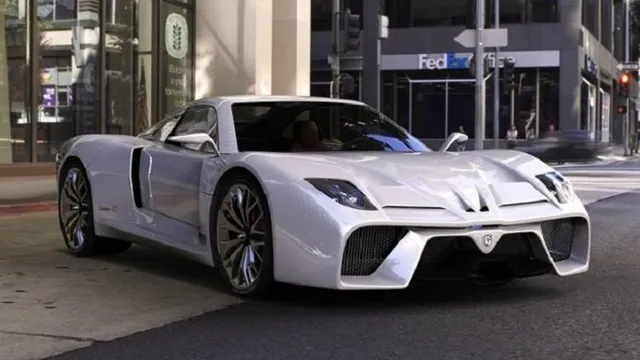Ready to take the plunge into the world of electric cars? With so much talk about horsepower ratings and power output, it can be difficult to make sense of it all. But don’t worry, understanding electric car horsepower is simpler than you might think. From the basics of what it is to how to best use it, this guide will help you become an expert in no time. Let’s get started!
What is Horsepower?
Horsepower is one of the most commonly used terms when it comes to discussing automobiles. It’s an important factor to consider when shopping for a new vehicle, as it will directly affect the vehicle’s acceleration and performance. But what exactly is horsepower, and how is it measured? Horsepower is a unit of measurement that describes how much work an engine can do in a certain amount of time.
It is calculated by multiplying the torque of the engine by the speed at which it rotates. For example, if an engine produces 250 foot-pounds of torque and has a rotational speed of 5,000 revolutions per minute (RPM), it would produce 1,250 horsepower. The term “horsepower” was coined in the late 18th century by Scottish engineer James Watt.
He wanted to compare the power of steam engines to that of horses, so he calculated that a horse could do work equivalent to 33,000 foot-pounds of torque over the course of an hour. This measurement was called one horsepower. When it comes to electric cars, the engine is replaced by an electric motor.
The power of an electric motor is measured in kilowatts. To convert kilowatts to horsepower, you can multiply the kilowatts by 3. For example, a motor with a power output of 100 kilowatts would be equivalent to 134 horsepower. When shopping for a new car, it’s important to take both the torque and horsepower into consideration. Torque measures how much force an engine can produce, while horsepower measures how quickly it can do work.
If you’re looking for a car with plenty of acceleration, look for one with a higher horsepower rating. On the other hand, if you want a vehicle that can tow a heavier load, a higher torque rating is the way to go. In conclusion, horsepower is a unit of measurement that describes how much work an engine or motor can do in a certain amount of time.
The Basics of Horsepower
If you’re a car enthusiast, you’ve likely heard of horsepower, but do you really know what it is? Horsepower is a unit of power that measures the rate at which an engine can perform. It’s a way to measure the power of a vehicle, usually expressed in kilowatts or watts. When it comes to electric cars, the horsepower is measured differently than with traditional gasoline-powered ones.
Electric cars are powered by an electric motor, which produces its power in kilowatts, or kW. This means that the horsepower of an electric car is determined by how many kilowatts the motor can produce. The more powerful the motor, the higher the horsepower rating of the electric car will be.

Calculating Horsepower
Have you ever wondered what the horsepower of an electric car is? This is an important question for those who are considering buying an electric car, as the horsepower is a measure of the car’s power and gives an indication of its performance on the road. To calculate the horsepower of an electric car, you need to consider the car’s battery size, motor size, gearing, and other factors. The size of the battery determines the amount of power available to the motor, while the gearing affects how quickly the car can accelerate.
Other factors, such as the type of electric motor and the number of cells in the battery, also have an impact on the total horsepower. Ultimately, the horsepower of an electric car is determined by the combination of these different components.
How is Horsepower Measured in Electric Cars?
With the rise of electric cars, many consumers are now wondering what the horsepower is of an electric car. Horsepower is a measure of power that is usually associated with gasoline-powered cars, and this can be a tricky concept to understand in the context of electric cars. Horsepower is a way to measure the rate of work that an engine can do in a given amount of time.
Gasoline engines generate power through the combustion of fuel, while electric cars generate power through electric motors. In the case of electric cars, the power output is measured in kilowatts instead of horsepower. A kilowatt is the equivalent of 1,000 watts.
A watt is a measure of the rate of energy used or produced over a period of time. In electric cars, this rate is measured in kilowatts. To convert kilowatts to horsepower, you would need to multiply the kilowatts by, For example:
| Power Output (kW) | Power Output (hp) |
|---|---|
| 25 kW | 33.525 hp |
| 50 kW | 67.05 hp |
| 75 kW | 100.575 hp |
| 100 kW | 134.1 hp |
| 125 kW | 167.625 hp |
| 150 kW | 201.15 hp |
This means that electric cars can have a wide range of power outputs, from around 50 horsepower to over 500 horsepower. Electric cars are also more efficient than gasoline-powered cars. This means that they use less energy to produce a given amount of power, which can result in a higher fuel economy.
In addition, electric cars tend to have a higher torque output, which can provide better acceleration. Overall, electric cars have a lot of advantages over gasoline-powered cars, and understanding the horsepower of an electric car is an important step in understanding how these vehicles work. By understanding the power output of an electric car and how it is converted to horsepower, you can make an informed decision when choosing a vehicle.
Measuring Horsepower with Electric Motors

Electric cars have been growing in popularity in recent times, and one of the key questions asked by consumers is, “What is the horsepower of an electric car?” To answer this question, we need to first understand what horsepower is and how it relates to electric motors. Horsepower is a unit of power that measures the rate at which work can be done and is the product of torque multiplied by angular speed. In terms of electric motors, this can refer to the amount of torque the motor produces when it is running at a certain speed.
To measure the horsepower of an electric motor, you would need to measure the torque output as well as the speed at which the motor is running. Using this information, you can then calculate the horsepower of the motor.
Factors That Affect Horsepower in Electric Cars
Electric cars are becoming increasingly popular for their environmental benefits, but many people are curious about the power performance of these vehicles. While electric cars don’t produce the same horsepower as gasoline cars, they can still be powerful depending on several factors. Weight, battery size, and the type of motor are just a few of the variables that can affect the overall horsepower of an electric car.
Additionally, the number of electric motors in the car can affect the total power output. Understanding these factors can help you determine the horsepower of an electric car before making a purchase.
Comparing Horsepower in Electric and Gas Cars
The battle between electric and gas cars has been raging for years, and there’s no clear winner when it comes to horsepower. Electric cars have a unique advantage in that they can produce higher torque levels than gas cars, allowing them to accelerate more quickly from a stop. However, the amount of horsepower an electric car can generate is significantly lower than that of a gas car.
Generally speaking, the average horsepower of an electric car is somewhere between 80 to 250, while gas cars can reach up to 600 horsepower or more. Ultimately, the type of car you choose should depend on the type of driving you’re looking to do. For those who value acceleration over top speed, an electric car may be the way to go. For those who want to go fast, a gas car is probably the better option.
Conclusion
Understanding electric car horsepower is essential for making an informed decision when purchasing an electric vehicle. Horsepower is a measure of power that describes how much work an engine or motor can do in a certain amount of time. In electric cars, horsepower is measured in kilowatts, with 1 kilowatt equal to 1.34 horsepower.
Factors such as battery size, motor size, gearing, and the number of cells in the battery all contribute to the overall horsepower of an electric car. While electric cars may not have the same horsepower as gas cars, they offer advantages in terms of torque and acceleration. Ultimately, the choice between an electric or gas car should depend on individual preferences and driving needs.
Frequently Asked Questions [FAQs]
What Is The Horsepower Of An Electric Car?
The average horsepower of an electric car is around 100 to 400, depending on the make and model.
What Are The Advantages Of An Electric Car?
Electric cars are more efficient than gasoline-powered cars, have lower emissions, and require less maintenance.
What Are The Disadvantages Of An Electric Car?
Electric cars typically have a limited range and may require more time to charge than refueling a gasoline car. Additionally, they can be more expensive to purchase than a gasoline-powered car.
How Long Does It Take To Charge An Electric Car?
The time it takes to charge an electric car depends on several factors, such as the type of charger, battery capacity, and the amount of charge remaining in the battery. Generally, it takes anywhere from 30 minutes to 12 hours.
What Type Of Fuel Do Electric Cars Use?
Electric cars do not use traditional fuels like gasoline or diesel. Instead, they are powered by electricity stored in rechargeable batteries.

I am James Beaupre, the founder of batteryvehicleprice.com. With a deep-rooted passion for vehicle batteries, I have dedicated my career to exploring and understanding the intricacies of this crucial technology. My website aims to provide valuable insights and information on battery-powered vehicles, empowering individuals to make informed decisions.
